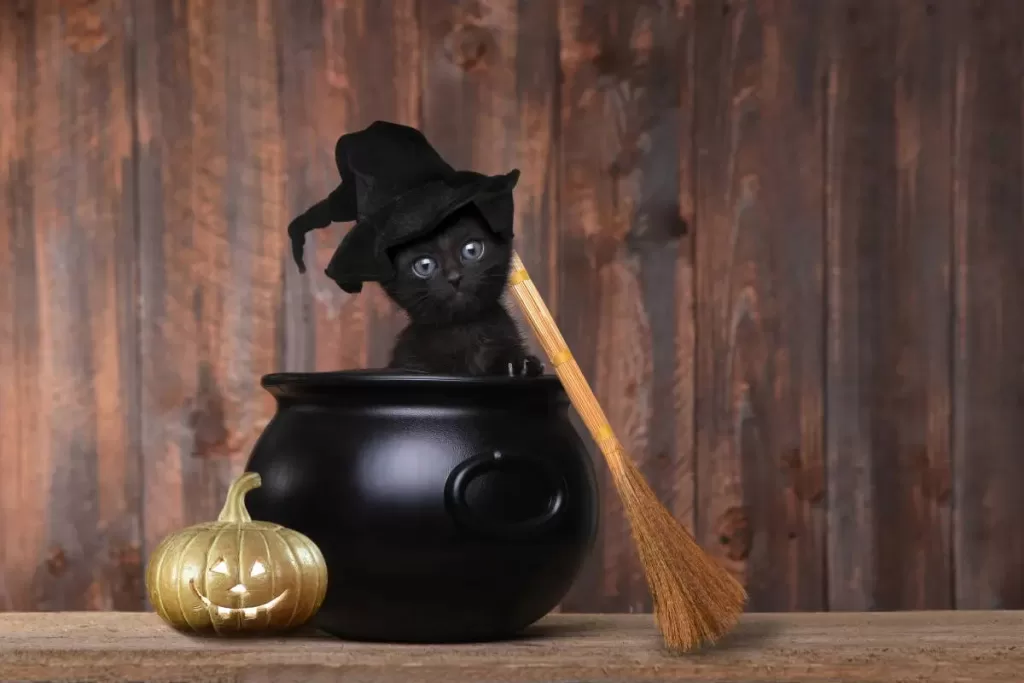Introduction to the Prejudice Against Black Cats
Can you imagine being discriminated against just because of the color of your fur? This is what happens to black cats, victims of prejudice rooted in different cultures. The stigma associated with these animals is so strong that in some parts of the country, they are considered bad luck or even associated with witchcraft.
But let’s cut the small talk and get straight to the point: prejudice against black cats not only explains how superstitions can negatively affect the lives of these cats, it also reveals a dark face of our society. They are kittens like any other and deserve all love and respect. So, it’s time to change that mindset and give these little dark-coated felines a chance.
Origin of Superstitions About Black Cats
The origin of the superstitions surrounding black cats dates back to ancient times. The historical roots of these beliefs are deeply rooted in various cultures and societies.
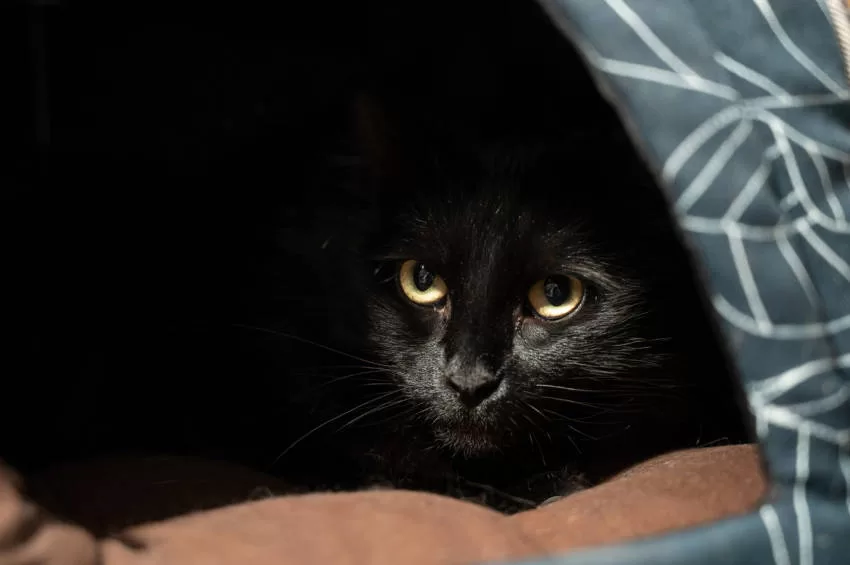
Historical Roots
- In ancient Egypt, cats were considered sacred and bringing harm to a cat, regardless of color, was considered bad luck.
- In the Middle Ages in Europe, black cats began to be associated with witchcraft. It was believed that witches turned into black cats to hide or perform spells without being noticed.
- During the Renaissance period, the idea persisted that black cats were familiar to witches or even witches in disguise.
These beliefs have been perpetuated over the centuries and still influence how we view black cats today.
Relationship with Witchcraft
The relationship between black cats and witchcraft has its roots in the Middle Ages. During this period, stories emerged that witches could turn into animals, especially black cats, to go unnoticed. Many people believed that if a black cat crossed their path it could bring bad luck or even be an omen of death.
This association with the supernatural has caused many to view these animals with fear and suspicion. Unfortunately, this superstition resulted in violent persecution of these innocent animals during witch hunts in Europe.
Perpetuated Beliefs
Superstitions about black cats did not end with the end of the Middle Ages or witch hunts. They are still alive today in different parts of the world:
- In the United States and some European countries, many people still consider it bad luck if a black cat crosses their path.
- In Japan, on the other hand, black cats are considered good luck charms.
- In the UK and Ireland, although it is generally accepted that a black cat crossing your path is a bad omen, finding one at random can spell good luck.
Although these examples show how beliefs can vary depending on the local culture, it is undeniable that the negative stigma attached to black cats has its origins in ancient superstitions related to black magic and witchcraft.
Superstitions vs Reality: Demystifying Beliefs
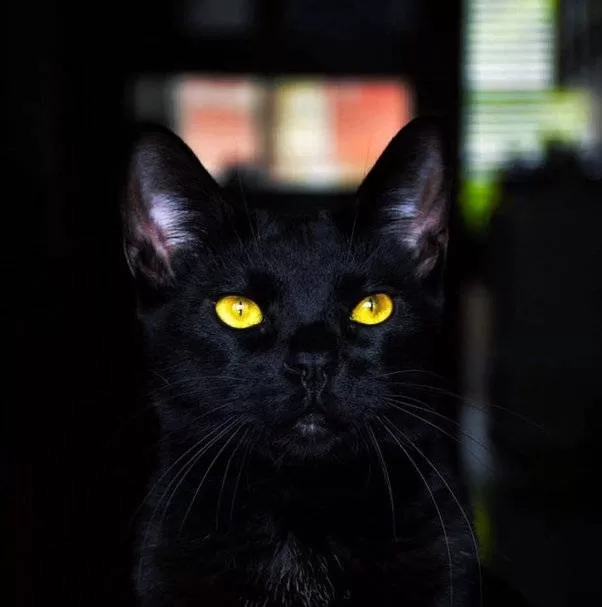
Popular Myths About Black Cats
Advertising and avant-garde TV in Brazil have perpetuated myths about black cats, fueling fear and discrimination. One of these myths is that they bring bad luck. But let’s unmask this:
- According to a study fair held in October, there is no correlation between cat color and luck;
- In many cultures, black cats are considered good luck charms;
- Since the days of the ancient Egyptians, black cats were revered.
Scientific Evidence Against Superstition
We all know that superstitions are based on beliefs, not facts. Science goes a step further to refute these baseless claims:
- According to researchers, the color of a cat’s fur has nothing to do with its behavior or personality;
- Studies show that black cats are less prone to genetic diseases compared to their other colored siblings.
The True Nature of Black Cats
Of the few reports available on the behavior of black cats in Brazil, some points stand out:
- Black cats are not more aggressive or skittish than other cats;
- They tend to be calmer and more affectionate when compared to their fellows of other colors.
But why does this discrimination persist? Well, unfortunately it’s a cultural issue rooted from time immemorial. However, we can all do our part to change this negative narrative.
Rather than perpetuating fear and superstitions about our dearly beloved black feline friends because of ancient folktales with no real scientific foundation, we should celebrate their unique beauty and unconditional love.
So the next time you see a beautiful black feline friend on the street or at an adoption fair, remember: they are as special as any other pet! Don’t let superstitions fool you.
Impact of Superstitions in Today’s Society
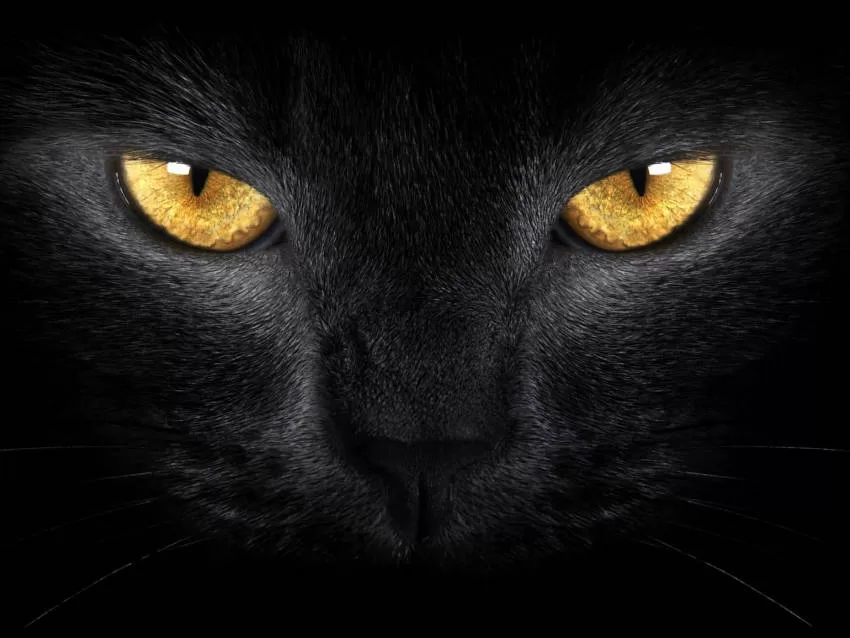
Perception of Black Cats
The influence of superstitions on the public perception of black cats is remarkable. Many people, influenced by ancient beliefs, associate these animals with bad luck or nefarious events. In many cases, this leads to rejection and even abandonment of these animals. For example, in animal shelter adoptions, black cats are often chosen last.
Media Role
The media plays a crucial role in perpetuating these stereotypes. Horror movies and TV shows often portray the black cat as a dark omen or associated with black magic. This reinforces superstitious beliefs and contributes to discrimination against these cats.
Consequences for Animals
The stigma surrounding black cats has real and harmful consequences for these animals. In addition to the aforementioned abandonment and rejection, there are reports of mistreatment motivated by unfounded superstitions.
Let’s see some data:
Adoption | abandonment | |
|---|---|---|
Black Cats | Low | High |
This table shows that the adoption rate for black cats is low while the abandonment rate is high.
Therefore, it is important to combat these superstitious beliefs with correct information and awareness about respect for animals.
To conclude, the impact of superstitions on black cats remains a relevant issue in today’s society. It is essential that all of us strive to change this reality through education and the promotion of respect for animals regardless of their color.
Racial Discrimination in the Adoption of Black Cats
Statistics on the Adoption of Black Cats
Research shows that black cats have the lowest adoption rates from animal shelters. In many cases, they spend twice as long waiting for a home compared to their counterparts of other colors.
- 70% of cats abandoned in shelters are black.
- Black cats take an average of 13 days longer to be adopted.
These alarming numbers reflect a sad and unfair reality: racism, superstitions and discrimination affect even our feline friends.
Challenges to Finding Homes for Black Cats
Rescues and shelters face significant challenges finding homes for these kittens. Often, they had to resort to special campaigns or promotions to encourage the adoption of these animals.
Some of the main challenges include:
- Unfounded superstitions associated with black cats.
- A preference for cats with light colors or unique patterns.
- The mistaken belief that black cats are aggressive or unlucky.
Real Stories of Racial Discrimination During the Adoption Process
There are numerous real stories that illustrate racial discrimination during the adoption process. For example, one woman reported being asked about her intentions in trying to adopt a black cat around Halloween, out of fear that she might use the animal for superstitious rituals.
Another story involved a couple who were encouraged to choose a different cat after they expressed an interest in adopting a black one, simply because “they don’t get along in pictures.
These are just a few examples of racial discrimination faced by black cats during the adoption process. It is important to remember that each animal is unique and deserves love and respect, regardless of the color of the coat.
Remember: when you choose to adopt an animal, you are saving a life. Don’t let unfounded superstitions or racial stereotypes influence your decision.
CROAM’s Role in Protecting Black Cats
The Regional Committee for the Observation and Monitoring of Mistreatment of Animals (CROAM) plays a vital role in the fight against racism, superstitions and discrimination towards black cats. This group is dedicated to monitoring cases of mistreatment, intervening when necessary to protect these cats.
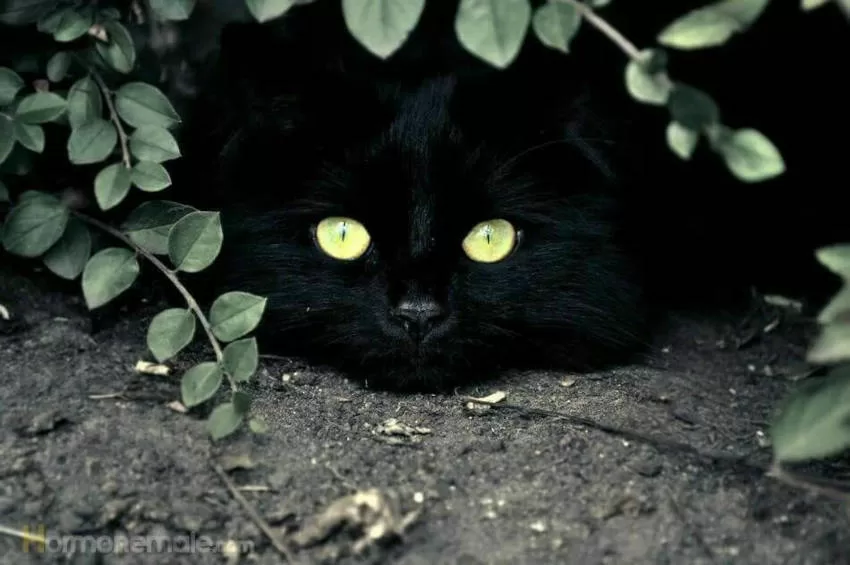
CROAM activities
Let’s talk about some concrete examples of CROAM’s successful performance. In a recent case, a family was on the verge of abandoning their black cat for fear of bad luck. CROAM stepped in, educating the family about the unfounded superstitions and helping them understand that coat color does not influence behavior or fate.
In another situation, the committee intervened when a black cat was the victim of physical abuse because of its color. CROAM ensured the cat received proper medical care and worked with authorities to ensure those responsible were punished.
How to Support CROAM
- Make a Donation: Financial contributions help with the rescue and care of animals.
- Volunteer: Donate your time to help with rescues or awareness events.
- Adopt an animal: Giving a black cat a loving home is a straightforward way to fight discrimination.
- Educate others: Spread knowledge about unfounded superstitions and promote equality among all animals.
Here is a simple table showing how you can support:
Ways to Support | Description |
|---|---|
donations | financial contributions |
Volunteering | time donation |
Adoption | Give animals a home |
Education | Promote knowledge |
Remembering that every small gesture helps in the great battle against racism, superstitions and discrimination towards black cats. And you? Have you thought about how you can be part of this change?
Personal Stories: Life with a Black Cat
Positive Experiences
- João, an amateur photographer, says that his black cat, Salem, is the perfect model. “He is very photogenic. Every time I take a picture of him, it looks amazing,” says João.
- Maria relates how her black cat, Binx, helped her get through a difficult phase in her life. “He was always there for me. Her purring was the best music to calm me down,” shares Maria.
- Pedro talks about how adopting his black cat, Luna, changed his perspective on animals. “She didn’t bring anything bad into my life. On the contrary, it brought love and companionship”, says Pedro.
Demystifying Myths
Owners of black cats are unanimous in stating that these felines do not bring bad omens or bad luck:
- Ana Paula: “My black cat crossed my path every day for years and I never had bad luck because of it.”
- Carlos: “I adopted a black cat on Friday the 13th and since then I’ve just been lucky!”
- Beatriz: “My grandmother always said that black cats were bad omens, but my kitten is the sweetest thing in the world.”
Reflections on Superstitions
Having a black cat can completely change owners’ perceptions of superstitions:
- Fernanda admits that she was afraid of adopting a black cat because of existing superstitions. But after living with Zeca, she realized how unfounded these beliefs are.
- Roberto says that before having his black cat he avoided going under stairs and was afraid of broken mirrors. Now he laughs at these superstitions.
In summary, owning a black cat can be a positive and enriching experience that challenges ancient myths and unfounded discrimination against these incredible felines.
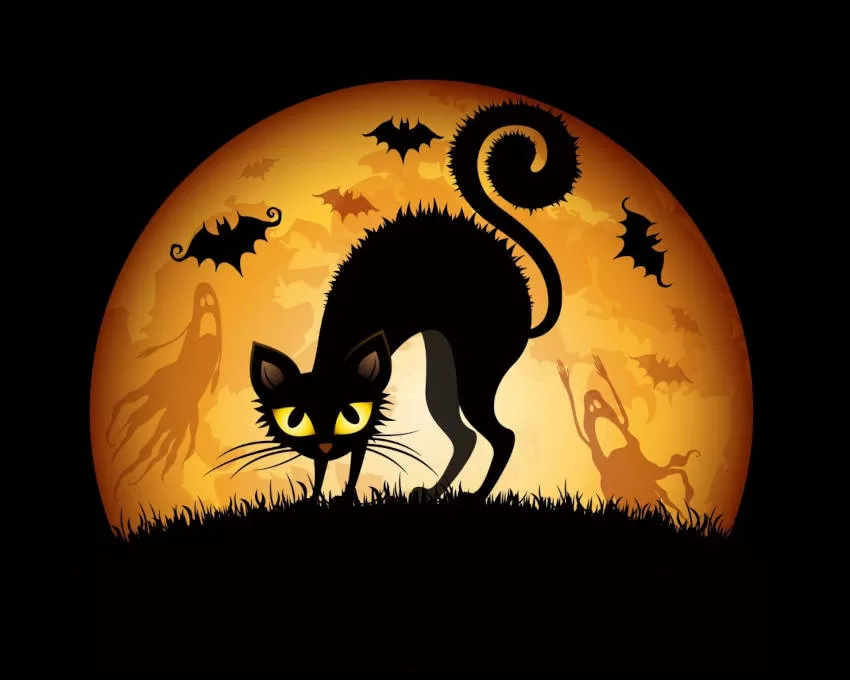
Conclusion: Reflections on Superstition and Discrimination
The superstition surrounding black cats is an ancient phenomenon with deep roots in human history and culture. Despite the demystification of many of these beliefs, discrimination persists, especially in the adoption of these cats.
The personal stories shared in this article show that life with a black cat can be just as rewarding as with any other pet. The important thing is to remember that all lives matter and that every cat deserves love and respect, regardless of their coat color.
CROAM has done an incredible job in protecting the rights of black cats. But we can all do our part to combat these prejudices. Whether it’s adopting a black cat or educating others about the realities behind superstitions.
We encourage you to join us in this fight against racism, superstition and discrimination towards our black feline friends!
FAQ
Why are black cats considered unlucky?
In the Middle Ages, black cats were associated with witchcraft. This stigma has persisted over time, resulting in the unfounded belief that they bring bad luck.
Are black cats different from other cats?
No! Black cats are no different from other cats in terms of personality or behavior. The only difference is the coat color.
Is it difficult to adopt a black cat?
Sadly yes. Due to existing superstitions, black cats are less likely to be adopted from animal shelters.
How can I help fight this discrimination?
You can help by adopting a black cat or educating others about the realities behind superstitions. Remember: information is power!
Where can I find more information about CROAM?
You can visit CROAM’s official website for more information about their work and how you can support them.
External Links:

